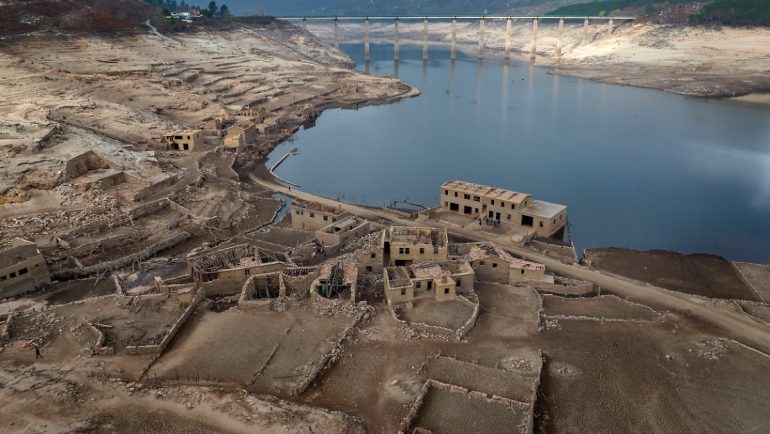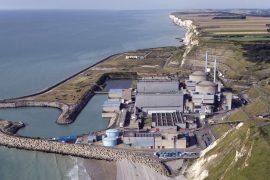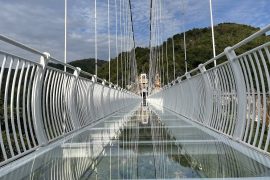“The grass won’t grow anymore”
Iberian Peninsula battles drought crisis
2/14/2022, 8:42 PM
The Iberian Peninsula is a popular holiday destination for tourists. However, due to extreme drought in the country, it is becoming difficult to supply water to the holiday guests. Affected people speak of a “disaster” that has dire consequences for humans and animals.
When the Intergovernmental Panel on Climate Change (IPCC) presents the consequences of global warming for humans and nature in the new part of its Sixth Status Report, these are not abstract warnings. Globally, extreme weather events such as hurricanes and droughts are increasing in frequency and intensity as a result of man-made climate change. Parts of Portugal and Spain are currently in the grip of severe drought. Already in winter there is not enough water for tourism, agriculture and electricity generation.
In central Portugal, a prolonged drought has exposed the ruins of a village completely submerged for nearly 70 years due to the construction of a large dam. “I’ve never seen it before,” says 76-year-old Carlos Perdigao, as he looks at the crumbling stone houses of Vilar, which were filled in 1954 by damming the Dzore River.
Winters in Portugal and neighboring Spain are generally relatively rainy. But according to their weather services, both countries have had the second driest January since 2000. The current drought is exceptional because of its “intensity, its extent and its length”, says Ricardo Des, a climate scientist at the Portuguese Meteorological Authority (IPMA).
water storage increasingly scarce
According to the European Union’s Copernicus Earth Observation Programme, 24 of the 55 Portuguese reservoirs are currently only half full and five are less than 20 percent full. The Algarve, Portugal’s southernmost province and one of Europe’s most popular tourist destinations, has been hardest hit by the drought.
In early February, Portugal ordered five of its hydroelectric power plants to suspend electricity production in order to release enough water for the population. Typically, about 30 percent of Portugal’s electricity comes from hydropower.
Spain received only a quarter of the normal rainfall in January, according to the weather service Emmet. The drought, which began in late 2021, is ruining crops, making fodder scarce and hindering hydroelectric power generation. Agriculture Minister Luis Planas said the government was concerned about the drought and would take “necessary action” based on development. Spain’s reservoirs are currently less than 45 percent full, according to officials, with Andalusia’s tourism sectors in the south and Catalonia in the northeast being the hardest hit.
“It’s a disaster for us”
Farmers in the Iberian Peninsula are also worried. “Look, there’s no more grass to feed the animals,” says cheese producer Estavao, who lives near the small town of Pampilhosa da Serra in central Portugal. “If it doesn’t rain in the next few days, it will be very difficult.”
The lack of rain is also jeopardizing the city’s efforts to lure tourists inland with floating pools in the Djore River. Due to the drought, the pool is now in a dry riverbed. “It’s a catastrophe for us,” says Mayor Henrik Fernandes Marx. In 2017, the same area was ravaged by wildfires that ravaged dry fields and forests, killing more than 100 people.
With rising temperatures, scientists expect more frequent and more intense periods of drought, which will affect more climate-sensitive regions and increase the risk of associated natural disasters. The alternation between dry and rainy years is common in southern Europe, says environmental expert Philippe Duarte Santos of the University of Lisbon. However, the proportion of rainy years has decreased recently.
“These droughts are one of the most serious consequences of climate change,” says Duarte Santos. In his estimation, the problem will continue until “a drastic reduction in greenhouse gas emissions”. Even in the short term, there is no clear-cut to dry regions in Portugal and Spain: below average rainfall is forecast for the coming weeks.

Introvert. Proud beer specialist. Coffee geek. Typical thinker. Pop culture trailblazer. Music practitioner. Explorer.





